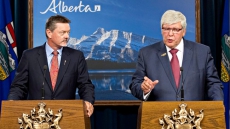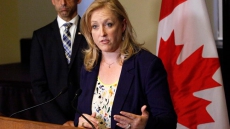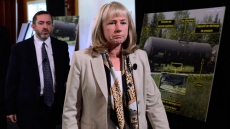A deal between Tim Hortons and Burger King could finally help the coffee and doughnut chain successfully expand into the U.S. market but it shouldn't mean customers will see any changes when they visit either fast-food chain.
Ken Wong, a marketing expert with Queen's University, said it is all about the U.S. for Tim Hortons.
"They've had some difficulty penetrating the U.S. market with dedicated Tim Hortons franchises and part of that is, of course, that while the brand is one of Canada's strongest, it really doesn't have much resonance in the U.S., especially up against Dunkin' Donuts," Wong said.
The companies confirmed Sunday that they are in talks and that the Oakville, Ont.-based Tim Hortons and the Miami-based Burger King would operate as stand-alone brands if they were to go ahead with a deal.
Jim Danahy, chief executive of consultancy CustomerLab, says the deal makes sense for Tim Hortons, given that the company has made it clear that it needed a partner on the ground in the U.S.
"They acquire, with this merger, access to the franchisees who own and operate more than 3,500 restaurants in the United States," Danahy said.
"It's access to the people who understand the U.S. market, infrastructure, distribution. It's not an insignificant benefit, and it's one that management said they were looking for."
Despite the sense of patriotism many Canadians may feel while drinking Tim Hortons coffee, the company has been owned by a large U.S. chain before. It was purchased by Wendy's International Inc. in 1995 and spun-off from Wendy's in 2006 after becoming a publicly listed company.
But while Tim Hortons dominates the Canadian coffee market, it has struggled to find success in the U.S., and has faced increasing competition at home in recent years from Starbucks Corp. and McDonalds Corp.
After taking over the top job last year, Tim Hortons chief executive Marc Caira launched a wide-ranging review of the company's priorities and ideas that could boost its reputation with both domestic and international consumers.
Tim Hortons has since added new menu items such as a crispy chicken sandwich and side dishes to boost breakfast and lunch sales. But that doesn't mean customers should expect to get a Whooper with their double-double if the deal goes through.
"There's zero chance you'll see Tim Hortons coffee in Burger King restaurants — Tim Hortons is not a well-known brand in the United States, it's not like you're putting Starbucks in there," Danahy said.
"It would have zero benefits for Burger King. It would only serve to make it more difficult for the owners of the company to sell off one or the other at some point in the future (and) that's what private equity is there to do."
If there was a deal, Burger King would be able to shave its U.S. tax bill in what's called a tax inversion, a move that has become increasingly popular among U.S. companies trying to cut costs. Tim Hortons actual tax rate so far this year has been about 28 per cent, up from about 26 per cent last year, increased in part because of its higher long-term debt, which isn’t eligible for a full tax benefit.
In an inversion, a U.S. company reorganizes in a country with a lower tax rate by acquiring or merging with a company there. Inversions allow companies to transfer money earned overseas to the parent company without paying additional U.S. taxes.
Brynn Winegard, a marketing expert at Winegard and Company, notes McDonalds has made a heavy play in the beverages market, so the combination is one that makes sense.
"In food service and in quick food service you need to have beverage offerings that are strong," she said.
"If they're going to grow and cut taxes, Tim Hortons is a very strategic choice (for Burger King)."
The deal would also give Tim Hortons an option to eventually grow internationally, given that Burger King had 13,667 restaurants in more than 95 countries and the U.S., including some 6,231, or 46 per cent, located outside the U.S. and Canada as of the end of last year.
As of June 29, Tim Hortons operated 4,546 restaurants, including 3,630 in Canada, 866 in the United States and 50 in the Middle East.
No financial details were provided, but the markets reacted positively to the possibility of a deal, with U.S.-based Burger King (NYSE:BKW) up 20.80 per cent to US$32.75 on the New York Stock Exchange. Shares in Tim Hortons (TSX:THI) jumped 20.97 per cent to C$83.20 on the Toronto stock market, up $14.42
Analyst Kenric Tyghe of Raymond James said Tim Hortons' take-out valuation range should be between $85 and $95, given the strategic benefits, revenue synergies and tax changes involved.
Under the deal, 3G Capital, the majority owner of Burger King, would continue to own the majority of the shares of the new company on a pro forma basis, with the remainder held by existing shareholders of Tim Hortons and Burger King.
The companies said the combined corporation would be the world's third-largest quick service restaurant company, with approximately $22 billion in system sales and over 18,000 restaurants in 100 countries worldwide.
NDP Industry critic Peggy Nash said Monday the opposition would seek more details about any possible deal and called for greater transparency under the Investment Canada Act, which covers large foreign takeovers in Canada.
"We want to make sure those jobs are protected as well as ensure that the Tim Hortons brand and the Tim Hortons experience continue to be part of our Canadian society," she said.
A spokesman for Industry Minister James Moore said Canada's total business tax costs are 46 per cent ower than those in the U.S., which generates jobs and boosts the economy.





